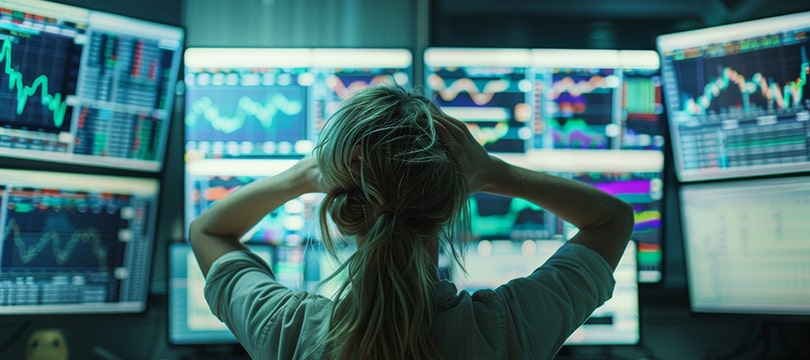3 Signs You're Overtrading
August 1, 2025

Have you ever found yourself at the end of the day with an endless list of opened and closed trades, but with the feeling of not having accomplished anything? If you identify with this situation, you might be a victim of a phenomenon known as over trading.
We'll discuss it in this guide. We'll explain what over trading is, how to recognize its early signs, and most importantly, how to prevent it.
What is Over Trading?
Over trading occurs when a trader executes an excessive number of trades, often driven by emotional impulses rather than a precise trading strategy. Such behavior, in fact, does not stem from an accurate market analysis, but rather from the rush to recover previous losses or the fear of missing out on profitable opportunities.
It is clearly a particularly harmful approach: it leads to a significant increase in trading costs, such as spreads and commissions, which over time substantially reduce the available capital. Furthermore, it exposes the trader to an excessive level of emotional stress, creating a vicious cycle that further weakens the ability to make rational and thoughtful decisions.
In short, over trading leads nowhere; instead, it leads to a state of psychological and financial prostration that the trader, regardless of their experience, would gladly do without.
The Signs of Over Trading
To avoid falling into the over trading trap, the first step is to recognize its signs. Here are the three main alarm bells.
Excessive Number of Daily Trades
The most obvious sign of over trading is also the most trivial: the presence of a very high number of trades made in a single day.
If you notice that your trading activities are characterized by continuous entries and exits from the market, in a number higher than other traders at your level, it is very likely that you are over trading.
You might be a victim of the impulse to enter the market frequently, which could stem from emotions such as the fear of missing an opportunity or the anxiety to quickly recover losses. Check, with a good self-examination, if you are experiencing these emotions too intensely.
Unbalanced Risk-Reward Ratio
When trades are made without respecting an adequate risk-reward ratio, often the reason is an impulsive approach to event management. If you find yourself opening positions with unrealistically low profit targets compared to the risk you are taking, you might be a victim of over trading. This behavior, besides being ineffective, increases the probability of accumulating substantial losses in the long run.
Constant Feeling of Anxiety or Stress
A third clear indicator of over trading is the constant stress generated by trading itself. If trading causes you constant emotional tension, anxiety in repeatedly checking your account balance, or a growing sense of frustration after each trade, you are probably overdoing it with the frequency of trades. Trading should be a structured and rational activity, not a source of uncontrollable stress.
How to Avoid Over Trading
Avoiding over trading requires discipline and awareness, key elements of a proper approach to trading. Here are three fundamental psychological practices to keep this behavior in check.
Establish a Rigorous Trading Plan
A well-defined trading plan is an essential tool to avoid over trading. It should include clear rules on when to enter and exit the market, the amount of capital to risk in each trade, and the precise conditions to be met to open a position. By disciplinedly following a detailed plan, you will avoid acting impulsively and maintain a long-term strategic vision.
Accept Losses as Part of Trading
Another good psychological practice is to change your approach to losses. Losses are inevitable in trading and should be seen as normal operational events, not personal failures to be recovered immediately. When you accept this concept, you will drastically reduce the temptation to increase trades to attempt hasty and impulsive recoveries.
Limit the Time Dedicated to Trading
Imposing time limits on your trading sessions can greatly help you avoid over trading. Defining precise time slots during which to operate will prevent you from falling into the temptation to trade continuously. This time discipline also allows you to improve your concentration and the quality of your decisions, significantly reducing stress and increasing overall mental well-being.
I recommend following these indications: you will be able to approach trading with greater awareness and serenity, avoiding the risks associated with over trading and increasing the chances of achieving positive and lasting results over time.




